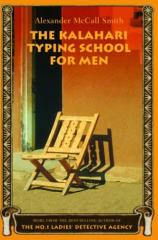The Kalahari Typing School for Men
Review
The Kalahari Typing School for Men
Western writers usually enter Africa by way of a protagonist who belongs to their own culture (missionary, functionary, explorer, soldier, mail-order bride) and is venturing into unknown territory. So it is one of the mysteries --- and miracles --- of recent fiction that a Scotsman named Alexander McCall Smith should have created a character like Precious Ramotswe, the full-bodied, clear-headed, absolutely captivating investigator who inhabits all four of his Botswana novels: THE NO. 1 LADIES' DETECTIVE AGENCY, TEARS OF THE GIRAFFE, MORALITY FOR BEAUTIFUL GIRLS, and now, THE KALAHARI TYPING SCHOOL FOR MEN.
Mma Ramotswe (in traditional Botswana culture, honorifics are always used; it seems rude not to do so in the review as well) has had a tough life: married to an abusive jazz musician, she loses her baby and then her beloved father. But she finds her vocation: she sets up the No. 1 Ladies' Detective Agency and is soon attracting clients. She also acquires a fiancé, garage owner Mr. J.L.B. Matekoni, two orphans, and a sidekick, Mma Makutsi, who received a grade of 97 percent on her exams at the Botswana Secretarial College. You don't have to be familiar with the first three books to follow the action in KALAHARI --- McCall Smith is careful to supply context for the first-time reader --- but I think it's better to discover them in order. Not only do you gradually develop a sense of Mma Ramotswe and her life on Zebra Drive (yep, that's the name of her street), but you also become deeply fond of Botswana (this is important since, to the average Westerner, Africa is still a "dark" --- that is, unknown --- continent). These wise, charming books leave you feeling washed clean and peaceful, with an expanded sense of humanity.
Although KALAHARI and the other books are technically mysteries, plot is not the main thing here. There are interlocking events --- a man across town opens a new detective agency; Mma Makutsi starts a typing school for men; Mma Ramotswe solves a case or two --- but there is little real tension or suspense. What keeps you reading is the wonderful writing: pure, economical, funny, utterly lacking in condescension. The evocation of Botswana is often lyrical (its quiet roads, its ubiquitous cattle). Sometimes the stories seem fable-like, as if McCall Smith is telling them around a campfire in the deep African night. This impression is reinforced by the repetition of certain phrases. Mma Ramotswe has a "tiny white van" and is "traditionally built." She believes in "the old Botswana morality" --- a phrase that covers everything from knocking and calling out "Ko Ko" before you enter someone's house to the deeper sense of courtesy and integrity that is being overwhelmed by modern life.
It is one of the many ironies of this wonderful book that Mma Ramotswe and her cohorts, despite their professed yearning for traditional values, are actually the smartest, most progressive people around. Because they are authentic and honest and guided by common sense rather than greed or pride, they make phony modernists like the proprietor of the rival Satisfaction Guaranteed Detective Agency look like idiots (the scene in which Mma Ramotswe and Mma Makutsi pay him a visit is priceless). Indeed, THE KALAHARI TYPING SCHOOL FOR MEN, more than the others in the series, is very much occupied with gender; it has a feminist streak a mile wide.
Consider the characters McCall Smith gives us: the entrepreneurial Mma Ramotswe and Mma Makutsi; the imposing head of the orphan farm, Mma Potokwani, who wangles free products and services from everyone ("It would take a degree of courage that few possessed to turn [her] down"); Mma Tsolamosese, whose daughter has died of AIDS and who is caring for her doomed grandchild with dignity and compassion; and Mma Boko, who is head of a local branch of the Botswana Rural Women's Association but refuses to run for office because "all [men] do is talk about money and roads and things like that. … We women have more important things to talk about."
With sly humor and wry tolerance, the novel captures that conspiratorial sense among women --- in any culture --- that men are not quite up to their standards (Mr. J.L.B. Matekoni being the exception, of course): "The trouble with men," muses Mma Ramotswe, "was that they went about with their eyes half closed for much of the time. … That was why women were so good at tasks which required attention to the way people felt. Being a private detective, for example. …" Or Mma Makutsi, commenting on the essays written by her typing-school students: "All of life seemed to be laid out before her: mothers, wives, football teams, ambitions at work, cherished motor cars; everything that men liked." And when Mma Ramotswe says her foster son is going through "a difficult patch," a friend replies dryly: "Boys do go through times like that. It can last for fifty years."
McCall Smith, it turns out, was born in what is now Zimbabwe (then called Southern Rhodesia) and taught law at the University of Botswana, but those facts alone hardly explain his astounding ability to enter the soul of a woman as well as the soul of Africa. He, like Mr. J.L.B. Matekoni, must be one of the exceptions, a good man. He is certainly an imaginative and observant one. Somehow he manages to communicate the specific feel and spirit of Botswana while also creating characters that transcend the barriers of geography, culture, and gender.
McCall Smith is writing a fifth Precious Ramotswe book, according to his publisher, and has started a new series featuring another lady detective, Isabel Dalhousie (Scottish father, American mother). I can't wait.
Reviewed by Kathy Weissman on January 22, 2011
The Kalahari Typing School for Men
- Publication Date: April 29, 2003
- Hardcover: 192 pages
- Publisher: Pantheon
- ISBN-10: 037542217X
- ISBN-13: 9780375422171





